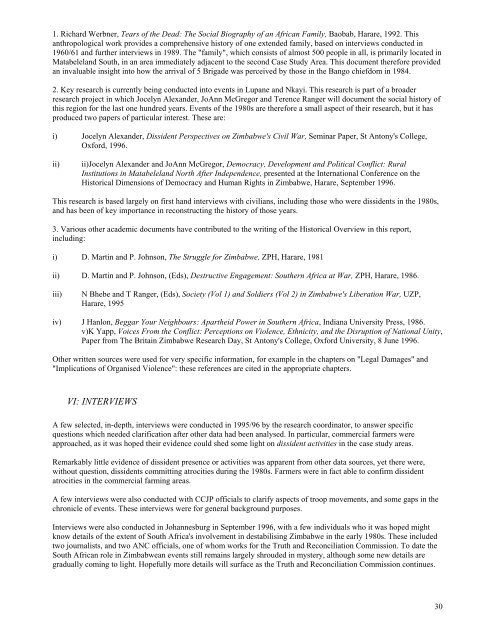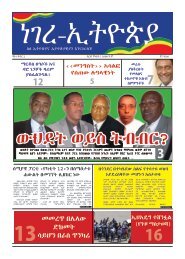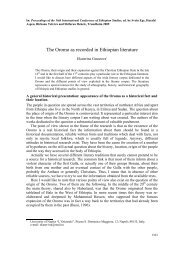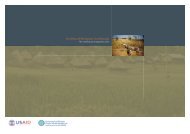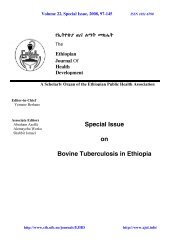MatabelelandReport
MatabelelandReport
MatabelelandReport
You also want an ePaper? Increase the reach of your titles
YUMPU automatically turns print PDFs into web optimized ePapers that Google loves.
1. Richard Werbner, Tears of the Dead: The Social Biography of an African Family, Baobab, Harare, 1992. This<br />
anthropological work provides a comprehensive history of one extended family, based on interviews conducted in<br />
1960/61 and further interviews in 1989. The "family", which consists of almost 500 people in all, is primarily located in<br />
Matabeleland South, in an area immediately adjacent to the second Case Study Area. This document therefore provided<br />
an invaluable insight into how the arrival of 5 Brigade was perceived by those in the Bango chiefdom in 1984.<br />
2. Key research is currently being conducted into events in Lupane and Nkayi. This research is part of a broader<br />
research project in which Jocelyn Alexander, JoAnn McGregor and Terence Ranger will document the social history of<br />
this region for the last one hundred years. Events of the 1980s are therefore a small aspect of their research, but it has<br />
produced two papers of particular interest. These are:<br />
i) Jocelyn Alexander, Dissident Perspectives on Zimbabwe's Civil War, Seminar Paper, St Antony's College,<br />
Oxford, 1996.<br />
ii)<br />
ii)Jocelyn Alexander and JoAnn McGregor, Democracy, Development and Political Conflict: Rural<br />
Institutions in Matabeleland North After Independence, presented at the International Conference on the<br />
Historical Dimensions of Democracy and Human Rights in Zimbabwe, Harare, September 1996.<br />
This research is based largely on first hand interviews with civilians, including those who were dissidents in the 1980s,<br />
and has been of key importance in reconstructing the history of those years.<br />
3. Various other academic documents have contributed to the writing of the Historical Overview in this report,<br />
including:<br />
i) D. Martin and P. Johnson, The Struggle for Zimbabwe, ZPH, Harare, 1981<br />
ii) D. Martin and P. Johnson, (Eds), Destructive Engagement: Southern Africa at War, ZPH, Harare, 1986.<br />
iii)<br />
N Bhebe and T Ranger, (Eds), Society (Vol 1) and Soldiers (Vol 2) in Zimbabwe's Liberation War, UZP,<br />
Harare, 1995<br />
iv) J Hanlon, Beggar Your Neighbours: Apartheid Power in Southern Africa, Indiana University Press, 1986.<br />
v)K Yapp, Voices From the Conflict: Perceptions on Violence, Ethnicity, and the Disruption of National Unity,<br />
Paper from The Britain Zimbabwe Research Day, St Antony's College, Oxford University, 8 June 1996.<br />
Other written sources were used for very specific information, for example in the chapters on "Legal Damages" and<br />
"Implications of Organised Violence": these references are cited in the appropriate chapters.<br />
VI: INTERVIEWS<br />
A few selected, in-depth, interviews were conducted in 1995/96 by the research coordinator, to answer specific<br />
questions which needed clarification after other data had been analysed. In particular, commercial farmers were<br />
approached, as it was hoped their evidence could shed some light on dissident activities in the case study areas.<br />
Remarkably little evidence of dissident presence or activities was apparent from other data sources, yet there were,<br />
without question, dissidents committing atrocities during the 1980s. Farmers were in fact able to confirm dissident<br />
atrocities in the commercial farming areas.<br />
A few interviews were also conducted with CCJP officials to clarify aspects of troop movements, and some gaps in the<br />
chronicle of events. These interviews were for general background purposes.<br />
Interviews were also conducted in Johannesburg in September 1996, with a few individuals who it was hoped might<br />
know details of the extent of South Africa's involvement in destabilising Zimbabwe in the early 1980s. These included<br />
two journalists, and two ANC officials, one of whom works for the Truth and Reconciliation Commission. To date the<br />
South African role in Zimbabwean events still remains largely shrouded in mystery, although some new details are<br />
gradually coming to light. Hopefully more details will surface as the Truth and Reconciliation Commission continues.<br />
30


